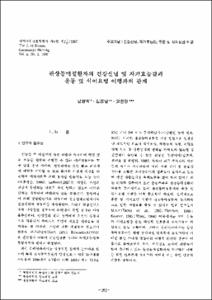관상동맥질환자의 건강신념 및 자기효능감과 운동 및 식이요법이행과의 관계
- Keimyung Author(s)
- Kim, Chong Nam
- Department
- Dept. of Nursing (간호학)
- Journal Title
- 지역사회간호학회지
- Issued Date
- 1997
- Volume
- 8
- Issue
- 2
- Keyword
- Health belief; self-efficacy; Exercise; Diet compliance
- Abstract
- This study evaluates the relationship between health belief. self-efficacy and exercise and diet compliance in coronary heart disease patients. The study subjects were 96 CHD patients who visited the outpatient clinic at 3 general hospitals in Taegu city from April 3, 1997 to May 3, 1997. Data was collected by the researcher and two registered nurses who work at a cardiac outpatient clinic. Face-to-face interview was conducted. Moon's health belief scale(l990) and Hicky and others' Cardiac Diet Self-Efficacy Instrument (CDSEI, 1992), Cardiac Exercise Self-Efficacy Instrument (CESEI, 1992) were used. The instrument developed by the researcher based on the reference review was used to measure exercise and diet compliance. The data were analyzed by using descriptive statistics, Pearson correlation coefficient, t-test, ANOVA, Tukey verification and Stepwise multiple regression with the SAS program. The results of this study were as follows; 1. The degree of health belief(score range: 1-4) perceived benefit: 3.06 barrier: 2.04 severity: 2.93 2. The degree of self-efficacy(score range: 1-5) exercise self-efficacy: 2.91 diet self-efficacy: 3.32 3. The degree of compliance (score range: 1-4) exercise compliance: 2.34 diet compliance: 2.95 4. The exercise compliance had a positive correlation with perceived benefit(r=0.5327, p=0. 0001), severity(r=0.2780, p=0.0061), exercise self-efficacy(r=0.6675, p=0.0001), and a negative correlation with barrier{r= -0.4236, p=0.0001). The diet compliance had a positive correlation with perceived benefit (r=0.6439, p=0.0001), severity(r=0.4244, p=0.0001), diet self-efficacy(r=0.6629, p=0.0001), and a negative correlation with barrier{r= -0.5098, p=0.0001). 5. According to pt's education level, (F=3.02, p=0.0336), received massage from mass media on exercise and diet(t=3.81, p=0.0002), presence of cardiac patients in the family members or friends(t=2.00, p=0.0478), created significant differences in exercise compliance. According to occuption(F=3.03, p=0.0215), hospitalized experience(t=4.59, p=0.0000), presence of chest pain(t=3.63, p=0.0005), there was also a significant difference in diet compliance. 6. The combination of exercise self-efficacy, perceived benefit and pt's education level explained 50.18% of the variance in exercise compliance. The combination of diet self-efficacy, perceived benefit and barrier explained 56.76% of the variance in diet compliance. On the basis of the above findings, the follow ing recommendations are suggested: 1. To promote the exercise. diet compliance for CHD patients, a well organized health teaching and nursing intervention program should be developed. 2. More research is needed to investigate other variables affecting exercise and diet compliance of CHD patients. 3. To promote self-efficacy and a positive health belief in CHD patients, a well organized and an approachable nursing intervention program should be developed. 4. Factors other than diet. exercise compliance should be evaluated to discover the impact on CHD patients.
- Alternative Title
- The Relationship between Health Belief • Self-efficacy and Exercise • Diet Compliance in Coronary Heart Disease Patients
- Keimyung Author(s)(Kor)
- 김정남
- Publisher
- College of Nursing
- Citation
- 남명희 et al. (1997). 관상동맥질환자의 건강신념 및 자기효능감과 운동 및 식이요법이행과의 관계. 지역사회간호학회지, 8(2), 262–276.
- Type
- Article
- ISSN
- 1225-9594
- Appears in Collections:
- 2. College of Nursing (간호대학) > Dept. of Nursing (간호학)
- 파일 목록
-
-
Download
 oak-bbb-04970.pdf
기타 데이터 / 806.72 kB / Adobe PDF
oak-bbb-04970.pdf
기타 데이터 / 806.72 kB / Adobe PDF
-
Items in Repository are protected by copyright, with all rights reserved, unless otherwise indicated.